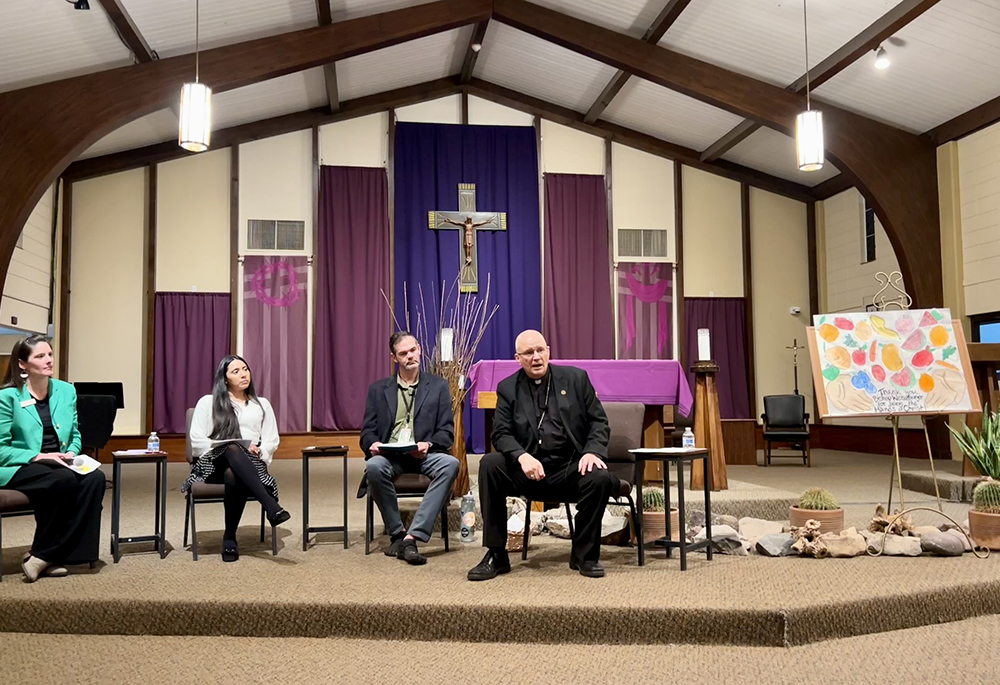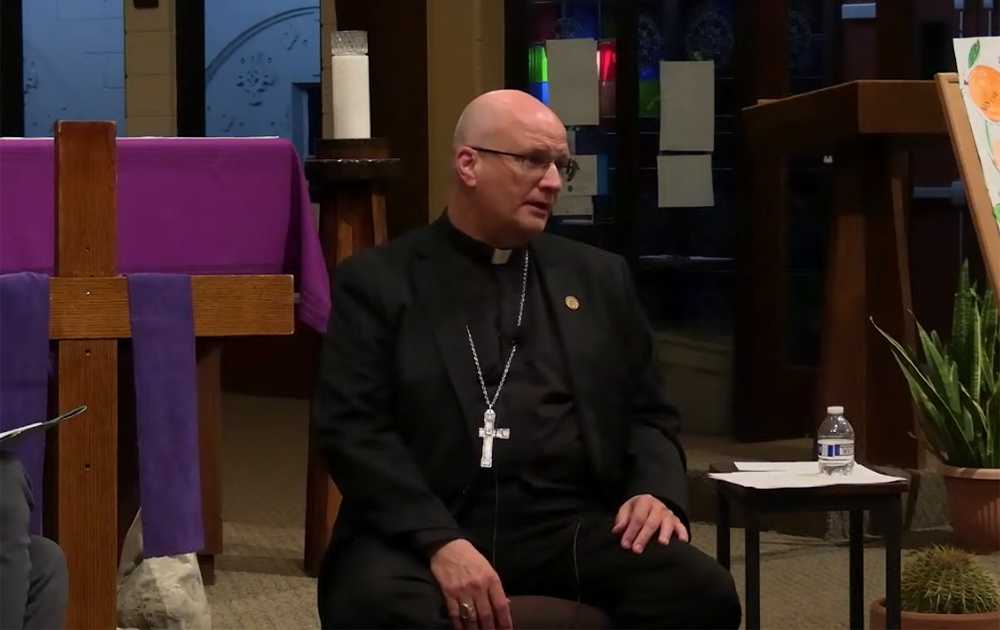
From left: Ellen Fisher, assistant director of the Catholic University of American in Tucson, Gabrielle Cardenas, a Catholic from South Tucson, Brian Eller, Pima County public health official, and Tucson Bishop Edward Weisenburger take part in a March 18 event on air pollution at the University of Arizona in Tucson. (Courtesy of Bishop Edward Weisenburger)
The Catholic bishop of Tucson, Arizona, thanked Pope Francis for calling out "irresponsible" lifestyles in the United States that have contributed to climate change.
Bishop Edward Weisenburger made the comments March 18 during an event at the University of Arizona focused on new federal air quality standards that he and other Catholic leaders supported during a November meeting at the White House.
Weisenburger explained his participation in the nearly hour-long meeting with Biden administration officials — including senior climate adviser John Podesta, a Catholic — was partly motivated by reading Laudate Deum, an apostolic exhortation "on the climate crisis" that Francis had issued a month earlier.
Near the end of Laudate Deum, the pope singled out U.S. contributions to climate change, writing, "If we consider that emissions per individual in the United States are about two times greater than those of individuals living in China, and about seven times greater than the average of the poorest countries, we can state that a broad change in the irresponsible lifestyle connected with the Western model would have a significant long-term impact."
For that observation, the Tucson bishop was thankful.
"I'm a very proud American, but I was so grateful the Holy Father had the nerve to go after us," Weisenburger told the gathering of students and Catholics at the campus' St. Thomas More Newman Center. "Gently, politely, with the greatest of kindness, but he said, 'America, you're causing a huge amount of this, now get with the program.' "
"I heard that and it resonates within me," he said. "And so I want to be a part of that program."
The comments are among the first publicly from a U.S. prelate addressing the pope's critique of American lifestyles as they relate to climate change.
In Laudate Deum — a follow-up to the pope's widely hailed 2015 encyclical "Laudato Si', on Care for Our Common Home" — Francis expressed frustration that global leaders and systems have so far not responded to the climate crisis with a scale and pace on par with what scientists say is needed to limit human suffering and ecological destruction spurred by a rapidly heating planet.
Action this decade is especially critical, with global emissions needing to be nearly halved in order to keep the Paris Agreement goal of limiting temperature rise to 1.5 degrees Celsius (2.7 degrees Fahrenheit) within reach.
Following the U.S. bishops' annual November assembly — where Laudate Deum was not on the agenda — Weisenburger headed to the White House with two other bishops and St. Joseph Sr. Carol Zinn, executive director of the Leadership Conference of Women Religious, where they sought to lend church support for a series of revised regulations proposed by the U.S. Environmental Protection Agency to curtail air pollution and the greenhouse gas emissions driving climate change.
Two of the rules, addressing soot pollution and methane emissions, have already been finalized. Two others addressing emissions released by burning fossil fuels from heavy-duty vehicles and power plants are expected later this spring.
EPA on Wednesday (March 20) also finalized the strongest-ever limits on tailpipe emissions from passenger cars and trucks, which are expected to lead by 2032 to the majority of new cars and trucks being all-electric or hybrids.
Careful not to take credit for the progress, Weisenburger called the environmental regulations "critical."
"We felt that the White House really heard what the Catholic Church has to say. They saw someone kind of giving voice to what Pope Francis is teaching," the Tucson bishop said.

Bishop Edward Weisenburger of Tucson, Arizona, thanked Pope Francis for calling out "irresponsible" lifestyles in the U.S. that have contributed to climate change. Weisenburger spoke March 18 during an event focused on air pollution at the University of Arizona. (NCR screengrab/YouTube/UACatholic)
He added the three bishops would have been less credible without the presence of Zinn, who in the meeting articulated how people who are poor and without a voice in rooms of power are the ones who suffer most from climate impacts like rising seas, heat waves and droughts.
"Women religious have really taken the lead on this," he said.
Students from Catholic schools presented the bishop with cards thanking him for his advocacy on clean air and climate action. The conversation that followed centered on the local impact of the new, stricter federal limits on toxic particulate matter (PM 2.5) in the air, also known as soot.
Brian Eller, a public health official for Pima County, said the new regulation will save lives, bring major health benefits and help address historic environmental injustices, especially for communities of color near Interstates 19 and 10 — who for decades have been exposed to disproportionate levels of air pollution and related health issues.
The stronger limits on PM 2.5 will result in decreased rates of respiratory and cardiovascular disease, fewer hospital emissions and premature deaths, said Eller, who is Catholic, especially in areas with poor air quality.
"People are more likely to get outside and walk around and interact with their environment if they're not breathing in smog and tire dust and chemical inhalants," he said.
Gabrielle Cardenas, a young Catholic from South Tucson, said the home her great-grandparents bought in the 1950s became "collateral damage from polluting industries" when it was discovered in the 1980s that an aircraft maker for decades had dumped trichlorethylene, a toxic industrial solvent, in the area. Her uncle was later diagnosed with leukemia and her aunt suffered from lupus.
"My great-grandparents bought into the American dream in the 1950s neighborhood," she said. "After the discovery of the pollution the people who could get out fled and it became an area of concentrated poverty for people of color struggling with a sense of hopelessness from these contaminants."
Quoting Francis in saying polluting the air is "a sin against ourselves and a sin against God," Cardenas said it's important for Catholics and others to work with community, religious and world leaders to ensure environmental protections.
"God is in charge of moving us forward for a better tomorrow. We just need to take those steps with God to be pulled in the right direction," she said.
Advertisement
Weisenburger and other speakers noted the importance of connecting with nature and community, especially in pursuit of solutions to environmental challenges, for mental health and countering climate anxiety that more young people are experiencing.
Noting the "nobility of little daily actions" that Francis uplifts in Laudato Si', they offered ways for people to get involved in environmental matters, such as an upcoming tree planting event, utilizing city services for hard-to-recycle plastics and accessing tools to advocate for environmental legislation.
Within the Tucson Diocese, numerous parishes have installed solar canopies in their parking lots as well as electric vehicle charging stations.
For his part, Weisenburger has ordered an electric car, and the chancery is also planning to install solar panels and a charging station. While not every person or family can afford those steps, "we can use a lot less electricity, we can be careful with water, we can recycle, and we can lend our voice," he said. "And when you put all those things together, that's what the Holy Father is telling us."
"He says there's no change without structural change, and there's no structural change without individual change. And so it takes on some level each of us being willing to make a change for the sake of all."







